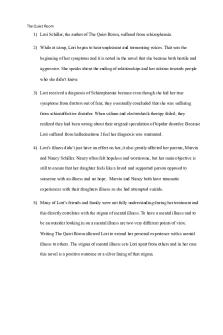The quiet room - Lecture notes 3 PDF

| Title | The quiet room - Lecture notes 3 |
|---|---|
| Course | Community Mental Health |
| Institution | Kean University |
| Pages | 3 |
| File Size | 61.7 KB |
| File Type | |
| Total Downloads | 8 |
| Total Views | 144 |
Summary
Response to the in class film " The quiet room"...
Description
The Quiet Room
1) Lori Schiller, the author of The Quiet Room, suffered from schizophrenia. 2) While at camp, Lori began to hear unpleasant and tormenting voices. That was the beginning of her symptoms and it is noted in the novel that she became both hostile and aggressive. She speaks about the ending of relationships and her actions towards people who she didn’t know. 3) Lori received a diagnosis of Schizophrenia because even though she hid her true symptoms from doctors out of fear, they eventually concluded that she was suffering from schizoaffective disorder. When valium and electroshock therapy failed, they realized they had been wrong about their original speculation of bipolar disorder. Because Lori suffered from hallucinations I feel her diagnosis was warranted. 4) Lori’s illness didn’t just have an effect on her, it also greatly affected her parents, Marvin and Nancy Schiller. Nancy often felt hopeless and worrisome, but her main objective is still to ensure that her daughter feels like a loved and supported person opposed to someone with an illness and no hope. Marvin and Nancy both have traumatic experiences with their daughters illness as she had attempted suicide. 5) Many of Lori’s friends and family were not fully understanding during her treatment and this directly correlates with the stigma of mental illness. To have a mental illness and to be an outsider looking in on a mental illness are two very different points of view. Writing The Quiet Room allowed Lori to extend her personal experience with a mental illness to others. The stigma of mental illness sets Lori apart from others and in her case this novel is a positive outcome or a silver lining of that stigma.
The Quiet Room
6) When Lori became sick she was an adolescent. This is important for a mental health worker to acknowledge because an event during her adolescence is what triggered her initial symptoms of schizophrenia. This event for Lori was being broken up with by her boyfriend. Adolescents and adults differ in the ways that they react to situations and experiences as their brains are at different developmental stages. 7) The medications offered in Lori’s treatment were Thorizine, Nardil, and Clozapine. She felt fuzzy and disoriented as a result of the Thorizine and the Nardil was not helpful which resulted in reckless behavior. It was Clozapine that helped Lori feel relief of her symptoms and allowed her to reconnect with other people. The side effects listed for these medications are consistent with the effects described by Lori. 8) The hospital treatment consisted of threats and isolation. Threats that if she did not comply and change her behavior she would be sent to a state hospital. She was isolated in the quiet room which kept her from acting on the things the voices in her head would tell her to do. Lori was also treated well in the hospital by Dr. Doller. Although he was not her doctor he helped Lori overcome the voices she was hearing and believe that what they were saying to her was not true at all. I’m not surprised by her treatment in the hospital as there are good and bad things everywhere. 9) The reason Lori kept returning back to the hospital was because before she tried Clozapine there were no successful medications. Dr. Doller helped Lori realize and reevaluate her self-worth which is what made the ultimate difference in her treatment. 10) I would describe Lori this way because while working at a restaurant she developed a reliance on cocaine. Cocaine eased Lori’s mind but once she ran out of money and out of
The Quiet Room
a way to get it the voices returned and stronger than before. Because the cocaine worked better than the medications she was being given at the hospital I believe this does affect her treatment. Essay: One thing Lori did not address in her novel is whether or not she would have children being aware that she could pass down her mental illness. Passing down the illness is not the only risk someone with schizoaffective disorder takes. It is also possible that someone with a mental illness, if not properly monitored and treated, could have an episode that could potentially negatively affect a child. Because motherhood is pushed on women by society I would expect this to be an additional pressure on anyone which is something someone would address with their mental health workers....
Similar Free PDFs

The quiet room - Lecture notes 3
- 3 Pages

BBC Writers Room Lecture
- 1 Pages

Cor quiet
- 18 Pages

Escape room notes
- 3 Pages

Level 3 - The Locked Room (book)
- 32 Pages

Lecture notes, lecture 3
- 5 Pages

Lecture notes, lecture 3
- 8 Pages

Notes#3 - Lecture 3 notes
- 49 Pages

Lecture notes, lecture 3
- 59 Pages

3 - Lecture notes 3
- 7 Pages

Quiet Enjoyment
- 3 Pages

The Room in the Tower - libro
- 14 Pages

Bishop - In the waiting room
- 2 Pages
Popular Institutions
- Tinajero National High School - Annex
- Politeknik Caltex Riau
- Yokohama City University
- SGT University
- University of Al-Qadisiyah
- Divine Word College of Vigan
- Techniek College Rotterdam
- Universidade de Santiago
- Universiti Teknologi MARA Cawangan Johor Kampus Pasir Gudang
- Poltekkes Kemenkes Yogyakarta
- Baguio City National High School
- Colegio san marcos
- preparatoria uno
- Centro de Bachillerato Tecnológico Industrial y de Servicios No. 107
- Dalian Maritime University
- Quang Trung Secondary School
- Colegio Tecnológico en Informática
- Corporación Regional de Educación Superior
- Grupo CEDVA
- Dar Al Uloom University
- Centro de Estudios Preuniversitarios de la Universidad Nacional de Ingeniería
- 上智大学
- Aakash International School, Nuna Majara
- San Felipe Neri Catholic School
- Kang Chiao International School - New Taipei City
- Misamis Occidental National High School
- Institución Educativa Escuela Normal Juan Ladrilleros
- Kolehiyo ng Pantukan
- Batanes State College
- Instituto Continental
- Sekolah Menengah Kejuruan Kesehatan Kaltara (Tarakan)
- Colegio de La Inmaculada Concepcion - Cebu


